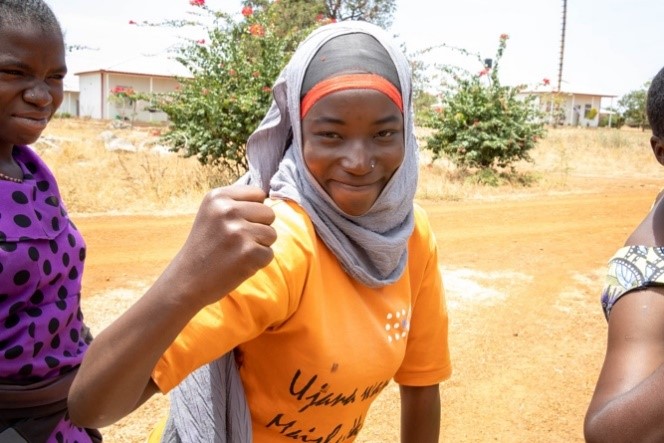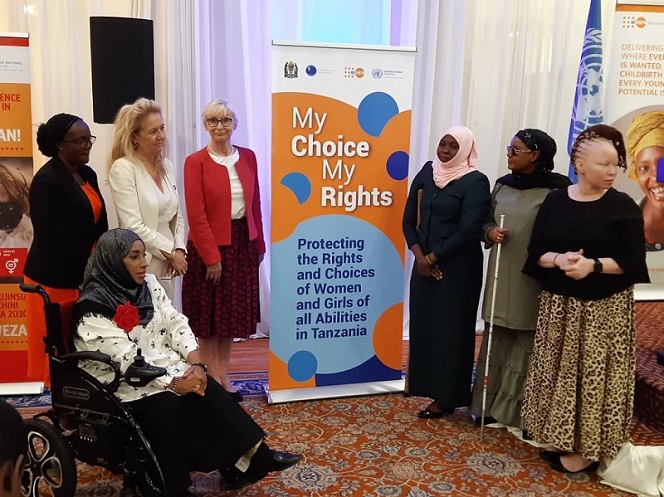Finland works for the rights of women and young people with disabilities in Tanzania
On the International Day of Persons with Disabilities, the Embassy of Finland highlights the rights of women and girls with disabilities. The sexual and gender-based violence faced by people with disabilities, as well as their lack of access to sexual and reproductive health (SRHR) services, is a serious problem that affects millions of women and girls globally and also in Tanzania. The new UNFPA programme 'My Choice My Rights' funded by Finland aims to ensure that all women and girls have the opportunity to live life free from violence and access the necessary SRHR services. The programme was announced during a high-level dialogue of the same topic in Dar es Salaam.
Women and girls with disabilities are more likely to experience sexual and gender-based violence during their lives
There are more than a billion people with disabilities in the world, 80% of whom live in the Global South. Statistically, disability is more common for women than men. When talking about the realization of the rights of people with disabilities, it is important to note how different physical, structural, attitudinal or communicative barriers in the society lead to discrimination against people with disabilities. Thus, disability alone does not prevent active participation in a society, but rather the structures of it.
An extreme example of this is the significant risk of women and girls with disabilities being exposed to sexual and gender-based violence and exploitation. The risk is up to 4-10 times more likely than for women and girls without disabilities. Stigma, discrimination, inadequate services and physical barriers make it difficult if not impossible for persons with disabilities to access services and information. Women and girls face more discrimination because of the gendered discriminative norms and structures. Therefore, women and girls with disabilities are in a higher risk of sexual and gender based violence because of the discrimination deriving from multiple factors.
In Tanzania, people with disabilities reportedly make up 6.8% of the population. The figure is well below the WHO global average (15%). This can be attributed to lower statistical coverage and disability-related stigma. In Tanzania, more people with disabilities live in the rural areas than in the cities. Tanzania's disabled are the most discriminated, the poorest and the most marginalized part of the population. There are currently no statistics on sexual violence in Tanzania, disaggregated by disability. Thus, it is uncertain how many women or girls with disabilities experience sexual violence, genital mutilation, or child marriage.
What does Finland do about it?
Promoting equality, especially in order to strengthen the status of people with disabilities, is one of the cross-cutting goals of Finland's development policy. Promoting the rights of people with disabilities is an important part of achieving the goals of Agenda 2030 and an extremely important human rights issue. Consulting people with disabilities and their own organizations and ensuring their participation in all activities is a key principle for Finland.
The ‘Chaguo Langu Haki Yangu’ My Choice My Rights programme, now under way, promotes the realization and physical integrity of women and girls and especially those with disabilities. The programme focuses on sexual and gender based violence of women and girls, as well as specific challenges related to sexual and reproductive health and rights. The programme has a budget of € 5.25 million and it is being implemented by United Nations Population Fund (UNFPA) together with Tanzanian partners for 3.5 years.

Picture: UNFPA Tanzania (Warren Bright/UNFPATanzania, 2021)
Inclusive and equal cooperation
To commemorate the rights of people with disabilities and as part of the international ‘16 Days of Activism’ campaign against gender based violence, 17 Tanzanian and Finnish organizations and the Embassy of Finland organized a high-level dialogue on the rights of women and girls with disabilities. High number of organizers guaranteed a good representation of organisations of persons with disabilities, of women with disabilities, and of young persons with disabilities, which all have their specific needs despite the common challenges. The dialogue had also broad representation of different stakeholders: governmental actors, civil society, and religious leaders from both Tanzania mainland and Zanzibar.

Picture: Launch of the 'My Choice My Rights' programme (Maiju Palosaari, 2021)
The main organizer of the seminar, UNFPA, showed example on how events can be organized on an equal footing with organisations of persons with disabilities, in the full spirit of nothing about us without us. In practice this meant for instance ensuring the accessibility of the event and coordination meetings. The seminar resulted a joint Policy Brief to strengthen the rights of women and girls with disabilities here in Tanzania. We encourage all partners to work with disability organizations to find the right and feasible solutions together.
Policy Brief in English (pdf, opens in a new window).
Text:
Maiju Palosaari
Coordinator for Development Cooperation

